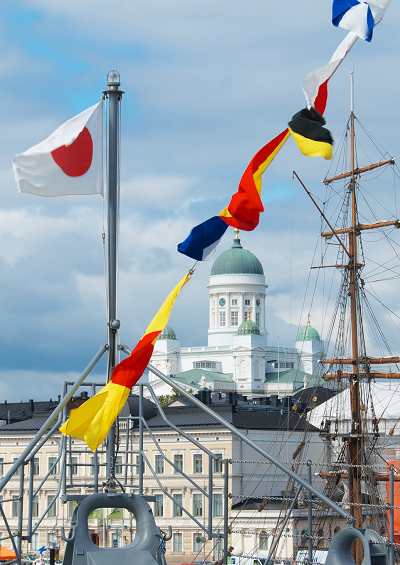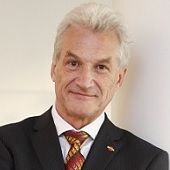Germany and Japan: A Comeback Story
A strategic reflection 70 years after the end of WWII.
March 7, 2015

Seven decades ago, in 1945, Germany and Japan were two devastated countries, with millions dead, their cities in ruins and governed by occupation forces. Only 20 years later, Germany and Japan both were among the strongest economic powers in the world.
Today, both are mature democracies and industrial countries with significant political clout. In the BBC’s world-wide Country Ratings Poll, they annually rank high in popularity.
This comeback story seems nothing short of a miracle. The “miracle,” however, can be explained by three crucial factors: U.S. support, good neighbors and a knowledge strategy are behind it.
1. U.S. support
The major victor of the war, the United States, was a rich country even in 1945, when much of the rest of the world was destroyed. To revive markets for the export of U.S. products, the U.S. government made a strategic choice to invest in Japan and Germany.
From 1947 onward, the United States gave $13.3 billion in grants and loans to Germany and 15 other European countries, as well as $2.44 billion to Japan.
Commercial considerations aside, it took exceptional political wisdom and leadership on the part of the United States to pursue a policy of generosity towards erstwhile enemies – not least considering that about half a million Americans lost their lives in the war.
2. Good Neighbors
Given the vastness of the atrocities committed by both Germany and Japan, it could not be assumed that the countries the two axis powers had attacked would be ready for reconciliation anytime soon.
And yet, from 1957 onward, Japan was able to normalize relations with all its former enemies, whether in Europe or East and Southeast Asia (except North Korea). Normalization with South Korea came in 1965 and with the People’s Republic of China in 1972, after shifting recognition from the Republic of China on Taiwan.
For Germany, the recognition of the horror of the Holocaust became a driver for reconciliation efforts in particular with Israel and Jewish organizations from the moment of the founding of the Federal Republic of Germany in 1949.
Germany’s re-integration into Europe took shape in the 1950s, by joining the European Economic Community and entry into NATO. These were the critical steps to provide reassurance of Germany’s genuine will to reconcile with its neighbors.
From the late sixities on, “Ostpolitik“ – or détente policy — was a tool also for normalizing relations with the countries of Eastern Europe.
For both Germany and Japan, it was a combination of factors which made reconciliation possible. Probably the most critical factor was genuine remorse, once the whole extent of the atrocities committed became clear to the wider public during the war crime trials in Nuremberg and Tokyo.
Another cornerstone was simply the hope for a better future. People who had seen – or caused – unimaginable suffering during the war needed a strong sense of direction.
Finally, the political – and existential — pressure exerted by the necessity to stand together, and alongside the United States, against the Communist threat in Europe as well as in East Asia played a crucial role as well.
In an environment where people easily might have wished for nothing but revenge, it required leaders wise and bold enough to try to do what was unexpected but what was best for the people, to come to terms with a painful past. Fortunately, such leaders were there when needed.
3. Knowledge societies
Germans speak of 1945 as “zero hour” to express that things started from scratch. Possibly in Japan the feeling was similar. In truth, it was far from a new beginning.
In both countries, society proved ready for reconstruction. Even though Nazism, fascism and militarism had reigned, the values of democratic governance and individual freedom had sufficiently grown roots.
In both countries, people had learned the major precondition for the success of a modern society – education. This dimension enabled both countries to develop sustainably. There also were scientists, engineers and managers who knew how to build industries and get the economies back in shape.
All of this resulted in Japan being the United States’ major security alliance partner in Asia and, as a free market economy, the anchor for the development of the region.
Germany, as the strongest economy in the European Union, became the engine of European development, a dynamic that has become more clearly visible than ever since the fall of the Berlin Wall.
Few remnants of past problems linger. One of those is to get Japanese–Korean relations right, as vocal minorities in both countries pursue antagonistic agendas.
In Europe, there is concern about Germany steamrolling over the interests of weaker EU economies – one reason why Berlin is very focused on maintaining close partnerships also with smaller countries in the current crisis over Greece.
A tumultuous new world order
The bipolar world order of post-WWII times as well as the unipolar order of post-cold war days are dissolving under the pressure of challenges, each of which has its own distinct nature.
In East Asia, China’s change from a poor, irrelevant communist country to the second-strongest economy in the world and a robustly assertive power leads to the question of how to define its new regional and global role.
In Europe, a strategy to deal with Russian efforts to reestablish a traditional sphere of influence has yet to be found. The expansion of Islamist extremism in the Middle East threatens the values of democracy, equality and freedom that the international system is built on.
Then, there are the more profound challenges such as climate change, the revolution in IT-guided industry, pandemics, migration, water and energy supplies.
In order to find solutions to rapidly arising new problems acceptable to a majority of states, the world needs to find a new order. Getting there is not so much a question of introducing new rules, as of a newly structured system that may allow stability and opportunities for all.
Next steps for Germany and Japan
Both Japan and Germany are medium-sized powers with some, but not an overriding, influence on global developments. They owe much of their postwar successes to strategies of balancing interests and objectives between many and diverse partners.
Both countries might successfully apply the lessons they have learned to tackle the new tasks. The BBC’s poll results are not the global response to German and Japanese friendly smiles. They reflect German and Japanese soft power.
This soft power is based on the trust that both countries managed to establish in the seven decades since the war. It is a trust in the competence of both countries to solve problems.
The fact that such trust could be built at all should give them today the confidence that they have the ability – maybe not to work miracles but to devise strategies to deal with the condition in which they and their neighbors and partners find themselves.
Editor’s Note: Adapted from January edition of Japanese-language bi-monthly “Gaiko” (Diplomacy)
Takeaways
Both Germany and Japan have acquired a great deal of soft power by garnering trust through competence.
Despite their defeat in WWII, Germany and Japan have grown into robust and mature democratic nations.
Through reconciliation and by being “good neighbors,” Japan and Germany made their comeback from WWII.
Economic support from the US went a long way to bringing Japan and Germany back onto the world stage.

